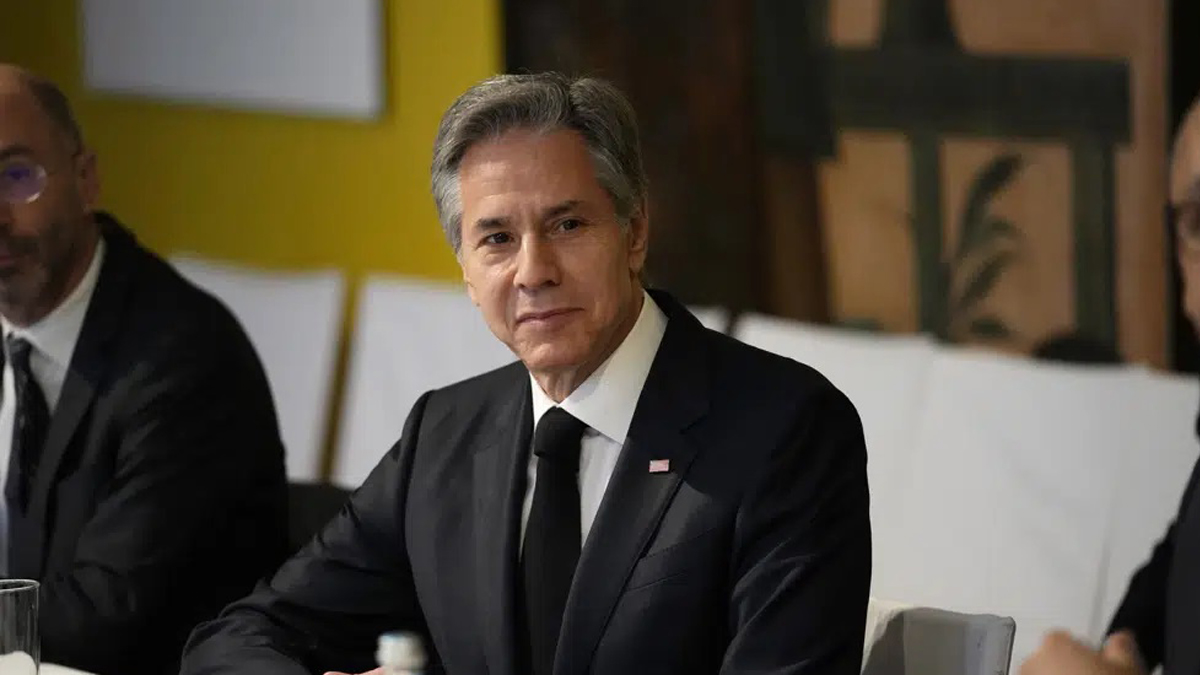
Blinken in Middle East for talks on Gaza, regional security

U.S. Secretary of State Antony Blinken is in Saudi Arabia for regional talks Monday and Tuesday on humanitarian assistance in Gaza, a post-war roadmap for the Palestinian territories, and stability and security in the Middle East.
“The secretary will discuss ongoing efforts to achieve a cease-fire in Gaza that secures the release of hostages and how it is Hamas that is standing between the Palestinian people and a cease-fire,” the State Department said.
Blinken will participate in a ministerial meeting of the Gulf Cooperation Council, a regional alliance of Arab countries bordering the Persian Gulf that is convening in Saudi Arabia’s capital.
On Sunday, the State Department announced Blinken would expand his trip to the Middle East, staying until Wednesday, and adding stops in Israel and Jordan after visiting Saudi Arabia.
Blinken will focus on the effort to secure a cease-fire in Gaza that would see the release of hostages and ensure humanitarian aid into the enclave continues or increases, State Department spokesperson Matthew Miller said in the statement.
Also Sunday, White House national security spokesperson John Kirby told ABC’s “This Week” show that the United States is continuing to push for a six-week cease-fire in the nearly seven-month war in Gaza between Israel and Hamas militants.
Kirby said that a makeshift Mediterranean Sea pier being constructed on the Gaza shoreline could be completed in two or three weeks so that more humanitarian aid can be transported into the narrow territory to help feed famished Palestinians.
Gaza, post-war roadmap
The humanitarian crisis in Gaza remains dire, despite an increase in daily aid and Israel beginning to utilize a northern crossing and Ashdod Port for humanitarian deliveries.
The United States is collaborating with partners to establish a maritime humanitarian corridor; however, these efforts are insufficient as the entire population of Gaza faces the risk of famine and malnutrition.
U.S. officials have stated that Washington is committed to advancing lasting peace and security for both Israelis and Palestinians, including through practical steps aimed at establishing a Palestinian state that exists alongside Israel.
Barbara Leaf, an assistant secretary of state for Near Eastern affairs at the State Department, said at a recent briefing, “The West Bank and Gaza must be reunified under the Palestinian Authority. A revitalized Palestinian Authority is essential to delivering results for the Palestinian people in both the West Bank and Gaza and establishing the conditions for stability.”
Washington has also made clear that Hamas should not play a role in such governance.
Analysts, however, say there are many hurdles to the U.S. vision.
Michael Hanna, the program director at the International Crisis Group, noted that the current Israeli government has shown a “total rejection of the idea of a two-state solution.” Moreover, “the physical reality has changed so dramatically since 1967 that it makes the possibility of a viable, contiguous Palestinian state almost an impossibility.”
He told VOA, “There’s no real assurance” that countries in the Middle East are particularly committed to post-war reconstruction in the Gaza Strip.
“It’s very difficult for many of these regional parties to engage politically at the moment while the war rages on.”
Prospects for Saudi-Israel normalization
The Biden administration continues to work on a potential agreement that could lead to normalization of Saudi relations with Israel, even as some officials and analysts consider it a remote possibility.
Israeli Prime Minister Benjamin Netanyahu has rejected the two-state solution and the return of the Palestinian Authority to control Gaza, demands that are widely supported by the international community.
The Saudis have demanded, as a prerequisite, to see an Israeli commitment to the two-state solution.
“If Netanyahu’s positions do not change, he will probably not be able to deliver normalization with Saudi Arabia. It may be that a U.S.-Saudi offer for such a normalization will be publicly made, so when Israelis go to the polls, they can take this option into account,” Nimrod Goren, a senior fellow for Israeli affairs at the Middle East Institute, told VOA in an email.
US reviews alleged IDF units’ rights violations
Blinken’s scheduled meetings in the Middle East come as the U.S. evaluates new information from the Israeli government to determine whether to blacklist certain Israeli military units.
These units are accused of violating the human rights of Palestinian civilians in the West Bank before the October 7 Hamas terror attacks on Israel.
Critics have pointed out that the State Department’s “slow rolling” in making its decision highlights the special treatment that Israel continues to receive.
VOA
- Pakistani Separatists Form New ‘Baloch National Army’ to Target Chinese Interests
- Six New Ambassadors Present Credentials to President Paudel
- National Assembly Endorses Five Government Ordinances
- Minister Shahi Discusses Climate Cooperation with Brazilian Counterpart at World Sustainable Development Summit












Comments